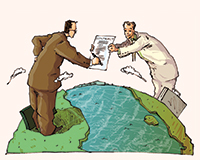Crossing continents to clinch the deal
Natalie Reynolds, founder of negotiation expert advantageSPRING and author of We Have a Deal, offers practical advice for people doing business overseas and agreeing terms with foreign entities
Whether it is negotiating the terms of a lease with a client in Indonesia, restructuring a contract with a supplier in Hong Kong or engaging a contractor from Germany, culture and geography will have an important influence on a negotiation.
But my advice is not to become intimidated or too obsessed by it all. As with everything in negotiation, awareness and knowledge is power.
Natalie Reynolds, founder of negotiation expert advantageSPRING and author of We Have a Deal, offers practical advice for people doing business overseas and agreeing terms with foreign entities
Whether it is negotiating the terms of a lease with a client in Indonesia, restructuring a contract with a supplier in Hong Kong or engaging a contractor from Germany, culture and geography will have an important influence on a negotiation.
But my advice is not to become intimidated or too obsessed by it all. As with everything in negotiation, awareness and knowledge is power.
By keeping in mind the following six key considerations, you are more likely to reach a beneficial outcome to your negotiations with business people from other cultures:
1 Research the stereotypes and differences
In When Cultures Collide: Leading across cultures, Richard D Lewis outlines the vastness and diversity of the world’s cultures. He offers a classification to assist the global business executive with navigating some of the common differences and similarities.
● Linear-actives: those who plan, schedule, organise and do one thing at a time. Germans and Swiss fall into this group. Common traits: introverted, patient, quiet, private, punctual, job-orientated, sticks to plans, sticks to facts, dislikes losing face, separates the social from the professional.
● Multi-actives: people who are lively and like to do many things at once; they plan their priorities based on thrill or the importance attached to each task. Italians, Latin Americans and Arabs fall into this group. Common traits: extroverted, impatient, inquisitive, talkative, not punctual, changes plans, people-oriented, seeks favours, expressive, interweaves the social and the professional.
● Reactives: cultures that prioritise courtesy and respect, listening calmly and quietly, and reacting carefully to each side’s view or proposal. Chinese, Japanese and Finns are in this group. Common traits: introverted, patient, respectful, good listener, reactive, people-oriented, thoughtful, plans slowly, controlled body language, connects the social and the professional.
Understanding some of the generalities that exist across cultures can help you to begin your planning and preparation. The model developed by Lewis could be used as a starting point for thinking about how to best communicate, provide information, present proposals and plan ahead for the duration and style of the impending negotiation.
2 Consider the social setting
Be aware that different cultures view the negotiation process differently. Some view it as a straightforward and pragmatic exchange of information that sits firmly within their professional sphere, whereas others will view it as a social ceremony in which there are specific considerations in relation to participants, hospitality and protocol.
3 Learn body language norms
Different cultures have varying interpretations of body language, such as facial expressions, physical contact, eye contact, hand gestures and what we do with our feet. There are also differing norms in terms of personal space. Do your research to avoid any awkwardness.
4 Language barriers exist within languages
This is not referring to the fact that different countries speak different languages and therefore an interpreter may be required. It refers instead to the fact that even within languages there can be varying nuances and interpretations that can have a huge impact. While English is often viewed as the international language of diplomacy and trade, it should be noted that words and phrases such as “fair”, “reasonable”, “level playing field” and “makes business sense” will have different meanings across different cultures.
5 Understanding decision-making
In many ways negotiation is simply the means and process of reaching a decision or series of decisions. How decisions are made can vary from culture to culture. There will be differences as to how long it will take to make a decision, who will be involved, whose opinion carries more weight and how binding a “final” decision really is.
Although it is important to do the kind of research listed above, it is also essential to remember a few key points.
● The danger of assumptions. Knowledge is power, but it is also essential that we don’t fall into the trap of assuming that cultural stereotypes and practices are universally true. For example, Lewis suggests that Brits are all polite negotiators and Americans are all confident negotiators, yet I have met many rude British negotiators and timid negotiators from the US. A clever negotiator should seek to understand what the stereotypes are, so that they can prepare for them if and when they are presented with them. Awareness rather than assumption has to be the key to effective preparation.
● The process of negotiation is universal. Human beings have been negotiating with each other since the dawn of civilisation. The key elements of the process of negotiation (trading, persuading, influencing, seeking an agreement, securing an outcome) are consistent in countries and cultures around the world.
6 Do your homework
It is essential that you research and understand how cultural differences could result in the negotiation being conducted differently or how the other party might behave because of where they come from, but it is just as important to remember that everyone is different. Treat each negotiation and each negotiator individually, and be prepared for anything.
To find out more about negotiation, visit www.advantagespring.com or connect with Reynolds on Twitter @advspringCEO











